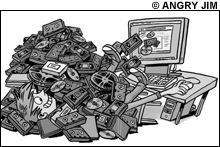
Television and movie studios aren’t quite sure what to do with YouTube. While they sort it out, music fans and pop-culture addicts are in hog heaven.
|
A couple of months ago, a man with the screen name x-amount logged on to Recidivism.org, the blog he maintains with a few of his friends, and made a pronouncement. “YouTube’s obviously blowing up. We’re living in that Napster-like magic moment where you simply can’t believe the kinds of historic stuff available to you with just a simple search. Which means of course that it’s all gonna get shut down ANY MINUTE.” His fears are understandable. For any pop-culture junky, YouTube.com, barely a year after its launch, may just be the Greatest Site in the History of the Internet. On a recent afternoon, guided by nothing more than capricious free association, I watched about two-dozen clips. The Sex Pistols’ infamous, profanity-laced appearance on Bill Grundy’s Today show. Hüsker Dü chatting with Joan Rivers. Crispin Glover, allegedly on LSD, frightening David Letterman. The only episode of Lookwell, the cop-show spoof written by Conan O’Brien and Robert Smigel, and starring original TV Batman Adam West. The only episode of Heat Vision and Jack, the story of a man and his talking motorcycle, created by Ben Stiller and starring Jack Black. Pudge Fisk’s homer over the Monster in the 1975 World Series. A PSA from a dead-serious Pee-wee Herman warning children about the dangers of crack cocaine.
That’s only the stuff I’m interested in. And it’s not counting the amateur material — game six of the ’86 World Series recreated on Nintendo’s RBI Baseball, or footage of the world’s second largest Tetris game, played out using the lights of a Brown University campus tower — that’s all over YouTube: the many millions of self-produced video curios posted to the site daily, almost one every other second.
Meanwhile, over on The Hype Machine, the hits just keep on coming. The site is an aggregator and search engine that scours the limitless galaxy of mp3 blogs that have cropped up over the past couple of years. You know: those sites with clever, lyrical names like Largehearted Boy and An Aquarium Drunkard? Sites curated by die-hard music fans who deal entirely in rare soul or underground hip-hop or twee indie pop, and who delight in writing music criticism alongside — free for download — the best track from the new Band of Horses album? Or the latest Diplo remix. Or live radio performances by Belle & Sebastian and the New Pornographers. Or tracks from not-yet-released Sonic Youth and Mission of Burma records.
These days, the songs and video clips that people once depended on file-sharing programs like KaZaA and Limewire to unearth are right there online, ready for download. No software installation required. No fear (for now at least) of a subpoena from the Recording Industry Association of America (RIAA), the trade group representing major labels. It’s a new world. Again.
Television and movie studios aren’t quite sure what to do with YouTube. The big record companies have been, on the whole, uncharacteristically quiet about the blogs, which are now more widespread and easier to search than ever. And a few even seem to see them as friends, not foes. While they sort it out, music fans and pop-culture addicts are in hog heaven.
“When you go [to YouTube], it’s kind of like going to a music store, when you know there’s a bunch of stuff you want, but you can’t quite figure out what it is,” says x-amount (whose real name is Beau). “But once you hit the right search term, it’s like, ‘Oh yeah!’ and ‘Oh, and then I could search for this!’ and ‘They might have this!’ It just explodes from there.”
Video stars
When Chad Hurley, 29, and Steve Chen, 27, founded YouTube in Hurley’s garage in February 2005, their plan was for it to be a personal video-sharing network, sort of a Flickr for home movies. It can still offer that function, but it’s also a lot more. “What we’ve become in the last several months,” says Julie Supan, YouTube’s senior director of marketing, “is an entertainment destination.” And how. By allowing clips to be streamed in lightweight Adobe Flash animation, YouTube made watching online video much more user-friendly than the traditional download-and-wait model. Uploading is a snap too. And by allowing users to insert YouTube videos directly into their blogs and MySpace pages, it helped ensure that its popularity would spread like kudzu. Once Saturday Night Live’s instahit “Lazy Sunday” video found its way onto the site last December, it positively blew up. Since then, says Supan, people have watched “billions” of videos. Nowadays, about six million unique visitors are watching about 40 million clips every day. And every day, about 35,000 more videos are being uploaded to the site. All told, that’s 200 terabytes of data per day — roughly a third of Google’s or Yahoo’s traffic. And it’s all handled by 26 employees headquartered above a San Mateo, California, pizza shop.